
Milestones ahead

Your Newborn's appearance
Love at first sight-loving your newborn baby's appearance, big head, bloodshot eyes, rashes and all.
Every baby looks different, and all are beautiful.
But most babies have some physical idiosyncrasies right after birth. Here’s what to expect:
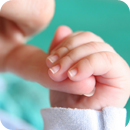
Your baby's reflexes
Getting a grip-understanding the reflexes that come naturally.
Your baby already has a good grip, and many automatic reactions or reflexes.
His startle reaction to sudden noises is just one of these. Other reflexes include:

Nurturing your baby's intellectual and social development
Together time: Interaction between you and your baby, even at this young age, will help determine his intellectual, social, and emotional development. How you respond to his cries, satisfy his needs, and show him love will determine how he sees the world later.
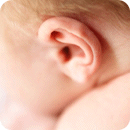
Sensory motor development
Sensory overload-from the dark womb to a world full of sights and sounds.
From the moment your baby enters this world he's learning.
Keep in mind that he has lived nine months in a dark, warm, and cozy womb and is now in the bright big world. His senses are being bombarded.
When your baby sees and hears he may:
What your baby loves to touch, taste, and smell:

Dreaming of sleep
Coping with your 1-month-old's unpredictable sleep patterns can be a challenge.
Newborn babies often seem to have no real sleeping pattern.
Often sleeping 16 to 18 hours a day, your baby will probably sleep for two to three hours, wake up, eat, and go to sleep again.
At about 6 weeks old, his sleep and wake pattern will begin to become established, and by 16 weeks, he may have settled into a regular schedule. So there is a routine in the not-too-distant future.
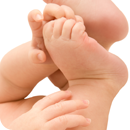
More than meets the eye
It may appear that your baby is passive – eating, sleeping, and waiting for you to do things for him.
The truth is, your baby is always reaching out

Establishing sleep patterns for your two-month-old
By the time your baby is 6-12 weeks old, he'll probably be sleeping for longer stretches of the night. If he's not, you may have to help him learn to fall back to sleep on his own.
Here are a few tricks
It may take a few days, but he’ll get the hang of it. Establishing this skill when your baby is still young will help prevent bedtime battles later.
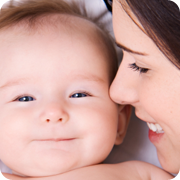
Getting Acquainted
This guide helps you understand him a little better, by explaining:
By month two, your baby will also get to know you better, smiling and actually recognizing the woman who's changed his diapers for the last 28 days.
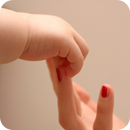
Fun with hands
By the third month, your baby will spend a large amount of time entertaining himself with his hands. Most of the time, his hands will be open. The act of opening and closing them, as well as staring at them, will be almost as fun for your baby as exploring his stuffed animals.
While it may look like its all fun and games, your baby is also working on strengthening his hand muscles. In five to six months, he should be able to pick up toys. To help him along, put a rattle in his hand, and gently tugs on it; this also helps him build muscle.
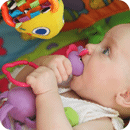
Your emerging social butterfly
Your baby is becoming quite social, taking in more and more of the world around him.
Help him get more acquainted

The big stretch
By 3 to 4 months old your baby should be sleeping for five-to-six hour stretches during the night.
Here are some tips to try to help him get his rest:
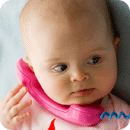
Making sense of the babble – helping baby develop language skills
Your baby is making sounds for a reason, even if you don't know what that reason is. One way to help him develop language skills is to imitate his noises, as if the two of you are having an intelligent conversation that only you can understand.
Other ways to help your baby develop language skills and understanding.

Keeping baby healthy – the importance of vaccinations.
Well-baby visits to the pediatrician are probably part of your monthly routine by now. Doctor visits are an opportunity for you to make sure your baby is growing and developing properly, and to ask any questions you may have. It is also the time when your baby will get the immunizations he needs (and make up any that he may have missed).
Regular vaccinations are still the only way to protect your baby - now and for years to come - so be sure to get your child immunized to help keep him healthy.

Rest for success
You've probably been told many times that babies should sleep on their backs. But now that your baby is rolling over, you can't control his sleeping position.
Here are some suggestions
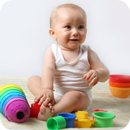
Exercises for the body and mind
Your baby's physical and mental development is important.
Here are some ways to help ensure that your baby develops to his full physical and cognitive potential:

Going slow will ease your baby's fear of new people
As your baby interacts even more with his world, his first fear may occur this month - a fear of strangers. This fear is normal. By this time, most babies have developed an awareness and recognition of key people around them, and a mistrust and fear of those who are not familiar.
Although this fear goes away with time and is nothing to worry about, it usually helps to introduce your baby to new people slowly.
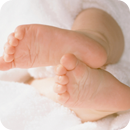
Outgrowing bowed legs and inward toes
There's no need to worry if your baby's feet seem flat or bent, his legs are bowed, or his toes point inward. Fortunately, these conditions are very common. Your health care professional will make sure that your baby's legs and feet are developing normally. Most minor leg and foot conditions are outgrown during childhood.
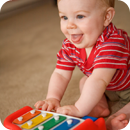
Sitting tall – practice makes perfect
It may seem like the change happens overnight – one day, your baby needs help sitting up, and on the next he's sitting up for the first time on his own. In fact, your baby has been silently working for months to sit up on his own.
He's been strengthening his muscles by sitting in his infant chair and by sitting propped up against pillows. While the first time he sits tall, he'll be leaning on his hands for balance, in the next two months, he will sit up completely and use his hands to play.
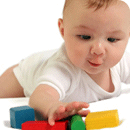
Meaningful play – games with a goal
This month, your baby's playful side may come out. Help him learn while he's playing with:
Activity boards that encourage him to push, pull, turn, and poke bells, wheels, and dials
Cloth, wood, or plastic blocks that help show your baby how to build towers and knock them down
Toy telephones, spoons, and measuring cups that introduce him to common household objects
Hand games that help him practice his fine-motor skills
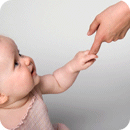
Taking the anxiety out of separation
Last month, your baby's first fear may have emerged - the fear of strangers. This month brings a new one – separation anxiety.
This fear typically begins at 6 to 8 months of age.
This is when your baby becomes aware that you're separate from him, and this means you might walk away at any time, which can be scary for your little one.
If your baby cries when you leave the room, or wakes up in the night crying and refuses to go back to sleep this month, he's probably suffering from separation anxiety. Because your baby's real fear is that you're going to leave and never return, the best way to alleviate his fears is to leave, then return, repeating the pattern, until he realizes you'll always come back.
To make this fun, play "peek-a-boo" - go away and come back before the fear gets too strong. Then have fun watching the ecstatic look on your baby's face when you return.

Sleeping through the night – dream come true
Once your baby is 6 months old, he'll begin sleeping through the night. But he may still occasionally wake in the night. At this age, if he still wakes up several times a night, talk with your health care professional about possible causes and solutions.
During the day, your baby will be wide-awake and active for extended periods, taking two or three short naps totaling three to four hours.
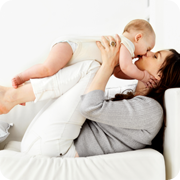
Sounds Familiar
He may even start understanding parts of the conversation you're making with him. This month, discover your baby's developmental milestones, and tips for:

Safe and secure – helping baby's mental and emotional health
Helping your baby feel secure and engaged in the world now can help him achieve emotional health and mental aptitude as he grows. Doing this is surprisingly simple at this age:
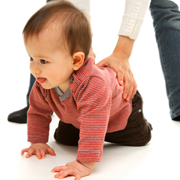
Starting Solid Foods
During month seven, your baby starts moving more independently, scooting around on his belly like a tadpole, and even, perhaps, eating his first cracker. This month, find out how to:
At the end of month seven, you're baby will probably be getting his first tooth, and hitting other key milestones.
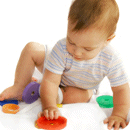
Sounds like fun – healthy play for minds and bodies
Your baby's language, recognition, and social skills are at an important stage of development.
Help ensure that his development stays on track by continuing to engage him in some of the following activities:
You may also want to make a photo album of familiar family members, and point to and name objects and people so your baby absorbs new words. He may stay interested only a few minutes at a time, but try to do this every day.

Getting her hands on "grown up" food
Once your baby can sit on her own in a high chair, mealtime becomes a party. She wants to grab the spoon, put it in her mouth, and bang it on the tray, creating her own special baby song.
Eating comes with other surprises as well.
Sometime in the sixth or seventh month, she may be ready to eat a cracker or dry cereal by herself. Not only does this introduce her to "grown-up" food, but it also lets her practice her fine-motor skills.
Keep in mind that even though she is eating solid foods, breast milk or formula is still her primary source of nutrition.
And remember, while it is difficult to never leave the room while your baby eats, it is important to stay with her to prevent choking or tumbles from the high chair.
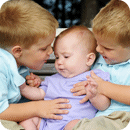
Kids and germs – the more they play the more they share
As your baby plays more with other babies and children, he's more likely to pick up colds and viruses.
Symptoms worthy of a visit to your pediatrician:
While every baby gets these illnesses, talk with your baby's health care professional if you notice any of the following symptoms:
Regular "well-baby appointments" during this time will also put your mind at ease, reassuring you that your baby is reaching developmental milestones and getting the recommended vaccinations that protect him from serious childhood illnesses.

Reaching beyond – helping your 8-month-old learn new skills
Simple and effective, these techniques can help you keep baby entertained and help her grow strong:
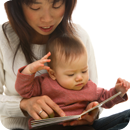
Bedtime made easy – creating rituals for restful nights
Near the end of this first year, it's a great time to create more involved bedtime rituals, such as reading the same book to him that your mother read you, rocking, or doing quiet activities together.
While it only takes 10 to 30 minutes, your bedtime ritual will help your baby look forward to bedtime, and find it easier to accept the separation from you when you finally leave the room. So that he'll be comfortable with anyone putting him to bed, it's good to involve loved ones early.
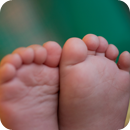
False flat feet – give it time.
If your baby's feet seem to be flat, you may be worried. But your baby's feet appear flat because a pad of fat is hiding the arch. This condition is very common in infants, and is usually nothing to worry about. You'll probably be able to see an arch when the fat disappears, usually in two or three years.

From peek-a-boo to pat-a-cake – play creates strong minds and bodies
While you've been guiding your baby along his road to development, the types of skills your baby develops, and the rate at which he develops them at this point, will be largely dependent on his own abilities.
Here are some things you can do to inspire and stimulate him:

Turning to Teddy Bear – the importance of comforting objects
Stuffed animals, toys, or blankets can be a big part of your baby's emotional support system.
In your baby's psyche, these objects have the power to:
Contrary to some theories, using a transitional object is not a sign of insecurity. It actually shows that your baby has been loved and nurtured, and that he is able to comfort himself. This is important as he becomes more independent.
Your baby will want to take his cuddly everywhere and may prefer it unwashed, because it has his scent on it. This may be what's so comforting about it.
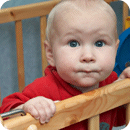
Separation anxiety – waking for reassurance
Just when you thought your baby was sleeping through the night for good, he's up again. Now, he's struggling with separation anxiety. He wakes up looking for you and for reassurance.
For a restful night sleep, try the following:

How saying "no" today will help you tomorrow
Your baby has a great need to explore - that means touching, tasting, and throwing everything in sight.
While these types of behaviors can be entertaining at times, discipline for negative behaviors will teach your baby self-control that will last well into her later years.
While you may have a negative association with discipline, and see it as punishment, it's really just a boundary you're creating to protect your baby from harm. Here are some suggestions for offering balanced discipline:

Ten-month milestones – from saying "mama" to waving bye-bye
All babies develop at different rates, but by the end of your baby's tenth month, he'll probably:

People to See, Places to Go
In the tenth month, your growing little one may be ready to become a regular baby-about-town, interacting with people and showing off his developmental milestones. Help him deal with his broadening world this month by:
By the end of this month, your baby might be walking, with a little help from you.
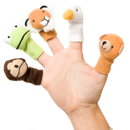
Puppet play, and other ways to engage you 10-month-old's mind
At this point, you can interact in an even more complex and creative way with your baby. Activities such as chatting with and singing to your baby are still effective.
You can also try these tips:
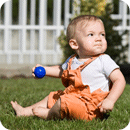
Separation made simple – slow is the way to go
Continuing separation anxiety and fear of strangers are signs that your baby has a healthy relationship with you.
Fortunately, here are some ways you can cope with them:
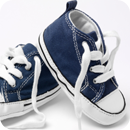
Choosing the right footwear for your baby
By the tenth month, baby needs new shoes. Look for the following in a baby shoe:
Baby shoes need not be expensive. Remember: Since your baby's feet will grow rapidly, the shoe size will have to keep pace. Check for sizing monthly.
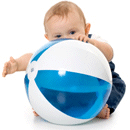
Smart play – engaging your 11-Month-old's growing mind
Because he's becoming so smart and inquisitive, your activities together become more interesting, engaging him cognitively and physically.
Here's what you can do together:

When your baby talks back – and other signs he's getting older
After months of being talked to, your baby is starting to talk back. He may not use real words, but he can point to a favorite book or toy when you ask. And as he continues to babble, he may even say a word or two.
So keep talking to your baby. Introduce pronouns such as "he" and "she," colors and simple concepts. By the end of the first year, you'll be amazed at how much he understands and says.
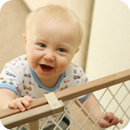
Safety first – tips for preventing exploration mishaps
This month, your baby's probably cruising along while gripping the furniture, in love with the novelty of standing. While he's running about,
Consider protecting him from common baby mishaps with these safety tips:
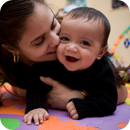
The power of hugs, and other ways to engage your 12-month-old's mind
This month, help him continue to develop by:
New activities to try:
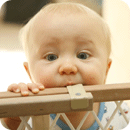
Safety first – graduating to the next level of precautions
If you haven't already, now is a good time to make sure you've taken all the baby safety measures you can.
Safety Checklist:
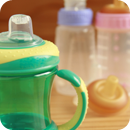
Tips for weaning baby off his bottle
Around 12 months of age, many babies are happy to abandon the bottle for a sippy cup. If your baby can't quite take that step yet,
Here are some things to try:
There may be some tears the first few nights but with your help your baby will soon find something he loves more than his bottle.